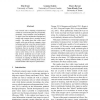Free Online Productivity Tools
i2Speak
i2Symbol
i2OCR
iTex2Img
iWeb2Print
iWeb2Shot
i2Type
iPdf2Split
iPdf2Merge
i2Bopomofo
i2Arabic
i2Style
i2Image
i2PDF
iLatex2Rtf
Sci2ools
108
click to vote
ACL
2012
2012
Distributional Semantics in Technicolor
Our research aims at building computational models of word meaning that are perceptually grounded. Using computer vision techniques, we build visual and multimodal distributional models and compare them to standard textual models. Our results show that, while visual models with state-of-the-art computer vision techniques perform worse than textual models in general tasks (accounting for semantic relatedness), they are as good or better models of the meaning of words with visual correlates such as color terms, even in a nontrivial task that involves nonliteral uses of such words. Moreover, we show that visual and textual information are tapping on different aspects of meaning, and indeed combining them in multimodal models often improves performance.
ACL 2012 | Computational Linguistics | Computer Vision Techniques | Nontrivial Task | Visual Models |
Related Content
| Added | 29 Sep 2012 |
| Updated | 29 Sep 2012 |
| Type | Journal |
| Year | 2012 |
| Where | ACL |
| Authors | Elia Bruni, Gemma Boleda, Marco Baroni, Nam-Khanh Tran |
Comments (0)

